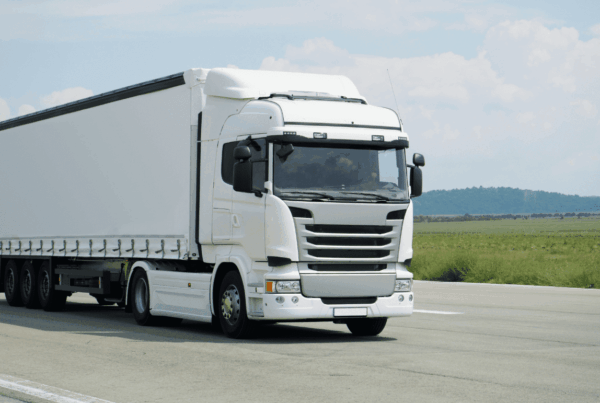When it comes to choosing between full truckload (FTL) and less-than-truckload (LTL) shipping, understanding the fundamental differences in cost, delivery time, and operational efficiency can significantly impact your supply chain management strategy. At Trans-Inter Logistik, we’ve helped many businesses navigate these transport options to optimize their logistics costs and delivery performance across Canada, the United States, and beyond.
In this article, we highlight the key differences between these two shipping methods, analyzing their advantages, limitations, and their impact on costs, delivery times, and merchandise safety. You’ll discover which solution is best suited based on the size of the shipments, speed requirements, and the specifics of your industry.
LTL or FTL Freight Shipping: What’s the Best Transport Option?
LTL and FTL transport each play a specific role in a modern logistics strategy. Full truckload transport offers dedicated space for large shipments, while less-than-truckload transport provides an economical solution for smaller loads by consolidating them with other shipments.
If you need help choosing the most suitable freight transport method, Trans-Inter Logistik offers its logistics expertise to evaluate the size of your cargo, your time constraints, and your budget. We propose the most efficient and cost-effective solution, ensuring a smooth and secure delivery of your goods, whether on a national or international scale.
Simplify Your Shipping Process with Trans-Inter Logistik
What is Full Truckload (FTL) Transport?
Full truckload transport is a shipping method where your cargo entirely occupies a semi-trailer. With FTL, shipments are transported directly from the point of origin to the point of destination without consolidation stops, which guarantees faster transit times and reduced handling.
This shipping strategy is particularly cost-effective when the cargo exceeds 15,000 pounds or occupies a large portion of the trailer’s space.
Main Advantages of FTL Freight
- Shortened Transit Times: Direct transport between the origin and destination, without intermediate stops, saves 1 to 3 days over long distances compared to LTL freight. This advantage is particularly strategic for urgent shipments and just-in-time inventory management, where every hour counts.
- Enhanced Security and Handling: Your cargo remains sealed in the same trailer throughout the transport, which reduces the risk of handling and damage. This is especially important for fragile goods (such as temperature-sensitive pharmaceuticals) and high-value shipments.
- Predictable Time Slots: FTL carriers offer fixed schedules for pickups and deliveries, which facilitates coordination with warehouses and distribution centers. This logistical precision enhances the reliability of the supply chain and allows for better responsiveness to customer expectations regarding punctuality and service.
Optimize the Transport of Your Goods
What is Less-Than-Truckload (LTL) Transport?
Less-than-truckload transport consolidates goods from several shippers in the same trailer space, thereby distributing transport costs among the participants. LTL carriers operate vast distribution networks with strategically located sorting centers to optimize route efficiency and achieve savings.
LTL shipping methods are generally suitable for cargo ranging from 150 pounds to 10,000 pounds, and even more in some cases. For example, a 24,000-pound load on a 26-foot trailer can still fall under LTL depending on the logistical context.
This makes it a flexible and ideal option for SMEs or businesses with variable shipping volumes. Our network of 3PL providers specializes in optimizing LTL transport, ensuring economical solutions adapted to various shipping needs.
Strategic Advantages of LTL Freight
- Cost-Effectiveness for Small Volumes: Sharing transport costs significantly reduces shipping expenses for partial loads. Companies can save between 40 and 70% compared to a full truckload.
- Flexibility of the Shipping Process: LTL carriers offer a wide range of services adapted to specific needs, from standard ground transport to expedited delivery, as well as specialized options such as liftgate, premium handling, or non-dock deliveries. This flexibility allows for optimizing shipments according to logistical constraints and recipient requirements.
- Reduced Environmental Impact: By grouping several shipments, consolidation optimizes the truck’s fill rate, which reduces CO2 emissions and promotes more sustainable logistics. This approach, independent of the carriers, also helps reduce empty trips and improve energy efficiency across the transport network.
Ship Smarter with Shared Transport
How to Choose Between LTL and FTL Shipping: 3 Essential Factors to Consider
1. Cargo Size and Weight
The choice of transport mode depends mainly on the space occupied in the trailer, the volume of the goods, and the cost-effectiveness, rather than on weight alone. It’s often difficult to base the appropriate transport mode solely on weight. For example, some foam containers can weigh between 4,000 and 5,000 pounds while occupying the entire trailer.
In this case, FTL transport may be more relevant despite a relatively low weight. Conversely, more compact shipments, generally between 150 and 5,000 pounds, are often more advantageous with LTL transport, provided their volume remains moderate compared to the trailer’s capacity.
Our team uses automated measurement technology to accurately assess the dimensions and volume of your goods. This analysis integrates both actual weight and volumetric weight, to recommend the most suitable and economical shipping mode, optimizing both costs and logistical efficiency.
2. Delivery Times and Market Conditions
FTL freight often offers a shorter transit time of 1 to 3 days over long distances compared to LTL, which requires more time for consolidation and sorting processes. Urgent and critical shipments favor FTL solutions, while regular replenishments can take advantage of LTL savings.
3. Handling and Protection of Goods
Fragile goods, temperature-controlled shipments, and high-value cargo benefit from the reduced handling that FTL offers. LTL shipments undergo several loading and unloading cycles in sorting centers, which increases the risk of damage for sensitive products.
Specific logistical needs, such as refrigeration for the cold chain, compliance with the transport of hazardous goods, or the handling of oversized cargo, often require a dedicated FTL solution capable of guaranteeing safety and compliance. Thanks to our network of specialized carriers, we offer customized options to meet your particular requirements, regardless of the type of goods to be delivered.
Let’s Talk About Your Shipping Needs!
Applications and Use Cases by Sector
Industrial and Manufacturing Shipments
- Automotive Industry: Large manufacturers use FTL freight for the transport of heavy machinery and prefabricated panels, while component suppliers rely on LTL for the distribution of smaller parts.
- Construction Projects: Large infrastructure sites, such as the construction of hydroelectric dams, require dedicated FTL capacity to safely transport heavy and oversized equipment. At the same time, LTL transport is used to ensure a regular supply of spare parts and secondary materials, thereby guaranteeing continuous logistical support throughout the project.
Distribution for the Retail and E-commerce Industries
- Consumer Packaged Goods: High-volume retailers take advantage of FTL transport to ensure rapid and massive replenishment of sales points, while specialized or seasonal products benefit from the flexibility of LTL to meet more targeted needs. Through a strategic selection of transport modes, our retail clients optimize their inventory management and improve their responsiveness to demand.
- Food and Beverage Distribution: The delivery of fresh products requires strictly controlled refrigerated transport. FTL is favored for high-volume shipments, while LTL is perfectly suited for smaller or varied batches. In both cases, the use of temperature-controlled trucks guarantees the maintenance of the cold chain and preserves the quality of the products throughout the journey.
Logistics for the Health and Pharmaceutical Sector
The transport of sensitive pharmaceutical products requires strict temperature control and high safety standards, often ensured by dedicated FTL solutions.
In contrast, small shipments of medical devices or common health supplies can be shipped more economically via LTL networks, provided they have thermal monitoring capabilities. This combination allows for reliability, regulatory compliance, and cost control.
Ensure the Efficiency of Your Shipments
FTL vs LTL Transport: Comparative Table
| Full Truckload (FTL) | Less-Than-Truckload (LTL) | |
| Definition | A single shipment entirely fills a dedicated trailer for one client. | Several small shipments from different clients share the trailer’s space. |
| Pricing Structure | Fixed or per-kilometer rate depending on the route, distance, and market. | Pricing based on freight class, weight, dimensions, and distance. |
| Delivery Speed | Faster; direct delivery without stops. | Slower; multiple stops to load/unload other shipments. |
| Handling | Minimal; loaded once, unloaded once. | High; multiple handling points during transfers. |
| Risk of Damage | Low; few transfers and handling. | High; more transfers increase exposure to risks. |
| Flexibility | Ideal for bulky, urgent, or sensitive freight. | Ideal for smaller, non-urgent shipments. |
| Examples of Goods | Heavy machinery, bulk products, high-value goods. | Store replenishments, small business shipments, partial orders. |
| Cost-Effectiveness | More cost-effective for large shipments. | More cost-effective for small shipments. |
| When to Choose | When you need speed, security, and a dedicated truck. | When you want to save on small shipments with no time constraints. |
Advanced Transport Management Strategies at Trans-Inter Logistik
Implementation of Hybrid Shipping Approaches
Innovative companies can combine LTL and FTL strategies based on seasonal variations in demand, product characteristics, and destination requirements. We analyze historical shipping data to recommend the optimal mode for each shipment.
- Optimization of Shipping Volumes: The consolidation of several LTL shipments into FTL loads during peak periods maximizes cost efficiency while maintaining service levels. This requires advanced planning and coordination among multiple recipients.
- Geographical Consolidation: Grouping shipments destined for similar regions reduces road transport costs and improves delivery density. Our analysis of the distribution network identifies opportunities for regional consolidation strategies.
Technological Integration and Visibility
Modern transport management relies on real-time tracking and Transport Management Systems (TMS) to optimize every shipping decision. Our carrier-independent platform offers complete visibility into LTL and FTL operations, enabling proactive exception management, rapid decision-making, and fluid communication with your clients.
Furthermore, transloading operations in strategically located distribution centers facilitate mode conversion, combining economical long-distance transport with optimized local delivery. This hybrid approach is particularly beneficial for international shipments requiring efficient domestic distribution.
Streamline Your Shipping Process
Why Partnering with Professional 3PL Providers Can Transform Your Transport Strategy
Working with an experienced transport company like Trans-Inter Logistik goes far beyond the simple choice between FTL and LTL freight. We support you at every step of your supply chain by:
- Managing freight classification systems
- Connecting you to a network of reliable carriers
- Coordinating your shipments both nationally and internationally
Our integrated approach aims to simplify your operations, optimize costs, and ensure a fluid execution, regardless of the complexity of your logistical needs.
Key Advantages of a Partnership with Trans-Inter Logistik
- Flexible Access to Equipment: Enclosed trailers, refrigerated trucks, flatbeds, liftgates for specialized deliveries.
- Smooth Multimodal Coordination: We ensure seamless management of palletized freight, individual parcels, and transloaded goods from intermodal containers, guaranteeing an efficient transition between different transport modes.
- North American Coverage: Network of selected carriers in Canada, the United States, and Mexico for reliable service.
- Optimized Distribution Strategies: Cost reduction, shortened transit times, and improved delivery performance through personalized planning.
For over 25 years, we have helped companies manage the complexity of FTL, LTL, and specialized transport by connecting them to trusted carriers and developing intelligent distribution strategies.







